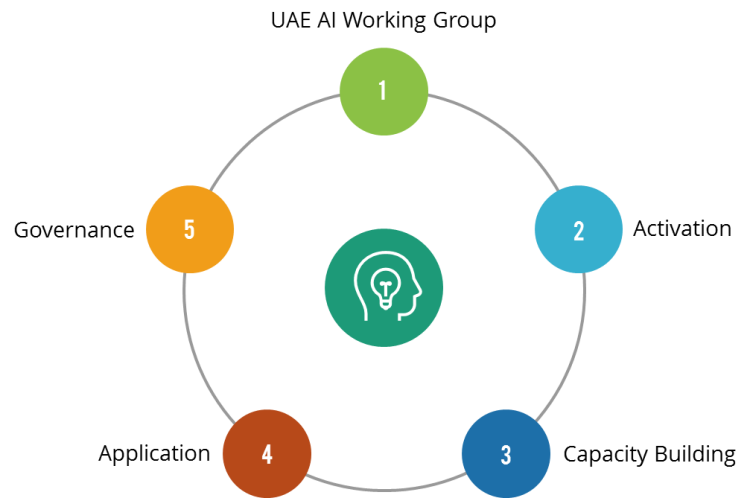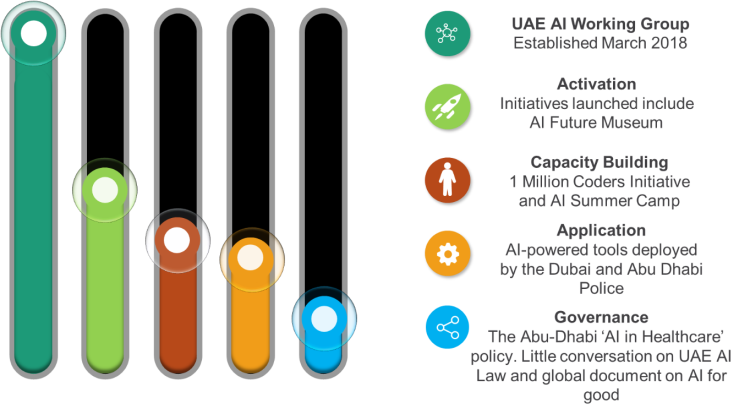Artificial Intelligence (AI) has been hailed as a transformative, revolutionary technology at the forefront of the fourth industrial revolution. With an expected global economic contribution of $15.7 trillion, nations world-wide are striving to develop and implement AI-friendly policies to encourage the adoption of AI applications in economic verticals including transport, health, space, renewable energy, and education.
This is the first of a series of articles aiming to familiarise readers with the AI strategies of some of the nations at the forefront of the fourth industrial revolution, starting with the United Arab Emirates.
UAE AI Strategy
In October 2017, the UAE was the first country to establish a Ministry of Artificial Intelligence, with H.E Omar Bin Sultan Al Olama as Minister of State for AI. Al Olama, who has served as the Deputy Director of the Future Department at the Ministry of Cabinet Affairs and the Future, was the lead contributor to the UAE’s 2071 Centennial Strategy and 4th Industrial Revolution Strategy.
The government’s 2031 Strategy for Artificial Intelligence is aimed at boosting government performance by integrating smart digital systems to overcome challenges (such as inefficient transport and slow healthcare processes); provide rapid solutions to citizens’ needs; establish the UAE as a hub for AI investments across the various economic sectors; and create a vibrant AI market with high economic value.
The Five Pillars of the AI Strategy
- UAE AI Working Group
The Council for AI, established in March 2018, is chaired by the AI Minister and includes representatives of the seven Emirates, a representative from the Prime Minister’s Office, the Director-General of Smart Dubai, and the Director-General of the Telecommunication Regulatory Authority. The council serves as the clearing house for all AI-related initiatives to ensure intersectoral coordination and consistent and equal AI adoption.
- Activation Pillar
This pillar is focused on launching initiatives to promote AI and its potential as a revolutionary technology. One initiative is the Museum of the Future, set to open in 2019.
- Capacity Building Pillar
Investments in education and skill development aim to encourage Emirati citizens to embrace and adapt to AI-induced changes, thereby establishing a high-value economic market and be at forefront of AI innovation. Past efforts include the AI Summer Camp launched in July 2018 and the 1 Million Arab Coders Initiative launched in May 2018.
- Application Pillar
The UAE hopes to provide 100% of their first-line services to the public through AI. The Dubai Police Strategy has successfully implemented AI in prisons and police station. The healthcare sector is seeing similar developments, with significant investments in deep neural networks for health diagnostics.
- Governance Pillar
The UAE is focused on launching a global leadership strategy to apply standards and regulations to ensure the safe and sound use of AI, as well developing government laws on the use of AI within the UAE, such as the Policy on Use of Artificial Intelligence in the Health Care Sector of the Emirate of Abu Dhabi issued in April 2018.
Levels of Progress Across Pillars of the 2031 Strategy
Challenges of the AI Strategy
The impact of emerging technologies on traditional labour intensive jobs such as retail and health has contributed to negative public perception of AI. To counteract this, the government can promote the benefits of AI through a strategic communications campaign and devote more resources to capacity-building initiatives, equipping the Emirati working population with the skills required to remain competitive in a technology-driven market and creating a feeling of security.
As the international community varies in their commitment to AI, from the AI-ready to the AI-unaware, the UAE should find the means to bridge the knowledge gap. This can be made possible by means of extending its capacity-building projects to include nationals of other countries, starting with neighbouring Arab countries. A universal agreement on AI for good will only materialise once the knowledge gap is filled.
In conclusion, the UAE’s 2031 AI strategy sets the country on the right trajectory to reap the benefits of AI; not least, it is expected to contribute to a 14% increase in the country’s annual GDP by 2030. The government’s commitment serves as a good starting point and model for countries wishing to join the AI revolution.
Author: Hussein Abul-Enein, Public Policy Analyst, Access Partnership

